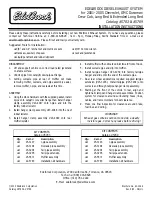
2000 Volvo S & V70
Deep scratches
1. Place a strip of masking tape over the damaged surface. Pull the tape off so that any loose flakes of
paint adhere to it.
2. Thoroughly mix the primer and apply it with a small brush.
When the primer surface is dry, the paint can be applied using a brush. Mix the paint thoroughly; apply
several thin paint coats and let dry after each application.
3. If there is a longer scratch, you may want to protect surrounding paint by masking it off.
pg. 114 Washing
Washing the car
· The car should be washed at regular intervals since dirt, dust, insects and tar spots adhere to the paint
and may cause damage.
NOTE: It is particularly important to wash the car frequently in the wintertime to prevent corrosion,
when salt has been used on the roads.
· When washing the car, do not expose it to direct sunlight. Use lukewarm water to soften the dirt before
you wash with a sponge, and plenty of water, to avoid scratching.
· Bird droppings: Remove from paintwork as soon as possible. Otherwise the finish may be
permanently damaged.
· A detergent can be used to facilitate the softening of dirt and oil.
· A water-soluble grease solvent may be used in cases of sticky dirt. However, use a wash place
equipped with a drainage separator.
· Dry the car with a clean chamois and remember to clean the drain holes in the doors and rocker panels
*.
· The power radio antenna (sedans) must be dried after washing.
· Tar spots can be removed with kerosene or tar remover after the car has been washed.
· A stiff-bristle brush and lukewarm soapy water can be used to clean the wiper blades. Frequent
cleaning improves visibility considerably.
· Wash off the dirt from the underside (wheel housings fenders, etc.).
· In areas of high industrial fallout, more frequent washing is recommended.
CAUTION: During high pressure washing, the spray mouthpiece must never be closer to the vehicle
than 13" (30 cm). Do not spray into the locks.
file:///K|/ownersdocs/2000/2000_SV70/00sv70_07.htm (3 of 6)12/30/2006 3:43:47 PM
















































